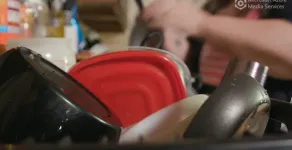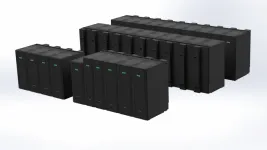(Press-News.org) Increasingly, social robots are being used for support in educational contexts. But does the sound of a social robot affect how well they perform, especially when dealing with teams of humans? Teamwork is a key factor in human creativity, boosting collaboration and new ideas. Danish scientists set out to understand whether robots using a voice designed to sound charismatic would be more successful as team creativity facilitators.
“We had a robot instruct teams of students in a creativity task. The robot either used a confident, passionate — ie charismatic — tone of voice or a normal, matter-of-fact tone of voice,” said Dr Kerstin Fischer of the University of Southern Denmark, corresponding author of the study in Frontiers in Communication. “We found that when the robot spoke in a charismatic speaking style, students’ ideas were more original and more elaborate.”
Can a robot be charismatic?
We know that social robots acting as facilitators can boost creativity, and that the success of facilitators is at least partly dependent on charisma: people respond to charismatic speech by becoming more confident and engaged. Fischer and her colleagues aimed to see if this effect could be reproduced with the voices of social robots by using a text-to-speech function engineered for characteristics associated with charismatic speaking, such as a specific pitch range and way of stressing words. Two voices were developed, one charismatic and one less expressive, based on a range of parameters which correlate with perceived speaker charisma.
The scientists recruited five classes of university students, all taking courses which included an element of team creativity. The students were told that they were testing a creativity workshop, which involved brainstorming ideas based on images and then using those ideas to come up with a new chocolate product. The workshop was led by videos of a robot speaking: introducing the task, reassuring the teams of students that there were no bad ideas, and then congratulating them for completing the task and asking them to fill out a self-evaluation questionnaire. The questionnaire evaluated the robot’s performance, the students’ own views on how their teamwork went, and the success of the session. The creativity of each session, as measured by the number of original ideas produced and how elaborate they were, was also measured by the researchers.
Powering creativity with charisma
The group that heard the charismatic voice rated the robot more positively, finding it more charismatic and interactive. Their perception of their teamwork was more positive, and they produced more original and elaborate ideas. They rated their teamwork more highly. However, the group that heard the non-charismatic voice perceived themselves as more resilient and efficient, possibly because a less charismatic leader led to better organization by the team members themselves, even though they produced fewer ideas.
“I had suspected that charismatic speech has very important effects, but our study provides clear evidence for the effect of charismatic speech on listener creativity,” said Dr Oliver Niebuhr of the University of Southern Denmark, co-author of the study. “This is the first time that such a link between charismatic voices, artificial speakers, and creativity outputs has been found.”
The scientists pointed out that although the sessions with the charismatic voice were generally more successful, not all the teams responded identically to the different voices: previous experiences in their different classes may have affected their response. Larger studies will be needed to understand how these external factors affected team performance.
“The robot was present only in videos, but one could suspect that more exposure or repeated exposure to the charismatic speaking style would have even stronger effects,” said Fischer. “Moreover, we have only varied a few features between the two robot conditions. We don't know how the effect size would change if other or more features were varied. Finally, since charismatic speaking patterns differ between cultures, we would expect that the same stimuli will not yield the same results in all languages and cultures.”
END
Can charismatic robots help teams be more creative?
Scientists found that students given a task by a social robot with a voice programmed to be engaging and inspiring performed better and were more creative than students who received the task from an identical robot with a flat voice
2023-05-22
ELSE PRESS RELEASES FROM THIS DATE:
Stop eradication of small mammals to protect vital ecosystems, say scientists
2023-05-22
A new article published in the Journal of Animal Ecology suggests that current measures to protect grasslands in the Qinghai-Tibetan Plateau are damaging the ecosystem and should be stopped.
The existing policy, introduced in 2000, calls for the eradication of small burrowing mammals. These include the mountain-dwelling herbivores, the plateau pika, and another small rodent, the zokor. Both are keystone species and are known as ecosystem engineers due to their modification of and impact on the environment.
The ...
Study linking mucus plugs and COPD mortality could help save lives
2023-05-21
A retrospective analysis of patient data from the COPDGene study suggests that targeting mucus plugs could help prevent deaths from chronic obstructive pulmonary disease—the fourth leading cause of death in the United States
Many patients with chronic obstructive pulmonary disease (COPD) experience airway-clogging mucus plugs, an accumulation of mucus in the lungs that can affect quality of life and lung functioning. A new study led by researchers from Brigham and Women’s Hospital, a founding ...
Sacubitril/valsartan shows benefit in heart failure with ejection fraction above 40%
2023-05-21
Prague, Czechia – 21 May 2023: Sacubitril/valsartan leads to greater reduction in plasma NT-proBNP levels compared to valsartan alone after stabilisation for worsening heart failure in patients with an ejection fraction (EF) above 40%, according to late breaking science presented today at Heart Failure 2023, a scientific congress of the European Society of Cardiology (ESC),1 and published in the Journal of the American College of Cardiology.
Principal investigator Dr. Robert Mentz of Duke University Medical Center, Durham, US said: “These data add to the evidence supporting a potential treatment benefit of sacubitril/valsartan ...
New device gently moves esophagus, making heart ablations safer, study found
2023-05-21
A new device invented with the help of an electrophysiologist at The Ohio State University Wexner Medical Center makes a heart procedure safer for patients suffering from atrial fibrillation (AFib), a common irregular heart rhythm.
AFib affects millions of people worldwide and greatly increases their risk of stroke and heart failure. To treat AFib, doctors use cardiac ablation to help restore the heart’s rhythm. Heat or cold energy delivered through a catheter destroys the heart tissue causing rapid and irregular heartbeats. ...
Society for Cardiovascular Angiography & Interventions names George D. Dangas, MD, MSCAI, President for 2023-24
2023-05-21
PHOENIX (May 20, 2023) – George D. Dangas, MD, PhD, MSCAI, Professor of Medicine (Cardiology and Surgery), and Director of Cardiovascular Innovation at the Zena and Michael A. Weiner Cardiovascular Institute at the Icahn School of Medicine of Mount Sinai in New York City, and Chief of Cardiology at Mount Sinai Queens assumed the office of president of the Society for Cardiovascular Angiography & Interventions (SCAI) today during the closing ceremonies at the SCAI 2023 Scientific Sessions in Phoenix, AZ.
Dr. Dangas is an authoritative voice in the performance of nonsurgical cardiovascular and valve interventions using both established ...
SCAI announces 2023-24 SCAI-WIN CHIP Fellowship Recipient
2023-05-21
PHOENIX (May 20, 2023) – Njambi Mathenge, MD, MPH, an interventional cardiology fellow at the Massachusetts General Hospital has been selected as the recipient of the SCAI-Women in Innovations (SCAI-WIN) CHIP Fellowship, the Society for Cardiovascular Angiography and Interventions announced today.
The $115,000 fellowship opportunity was made possible by support from Abiomed (founding supporter), Boston Scientific, Medtronic, and Shockwave Medical, Inc., and is offered to interventional cardiology (IC) fellows or practicing interventional cardiologists interested in ...
SCAI announces new award recognizing the contributions of early career interventional cardiologists
2023-05-21
PHOENIX (May 20, 2023) – Today during the SCAI 2023 Scientific Sessions, thirty early-career interventional cardiologists were the inaugural recipients of a newly created award highlighting excellence in interventional cardiology. 30 in Their 30’s is a new recognition program created by the Society for
Cardiovascular Angiography & Interventions (SCAI) for early-career members for their proven leadership and demonstration of SCAI’s core values.
30 in Their 30’s recognizes the best and brightest young professionals in interventional cardiology. This award ...
Society for Cardiovascular Angiography and Interventions bestows highest designation ranking to leading interventional cardiologists
2023-05-21
PHOENIX (May 20, 2023) – Today, the Society for Cardiovascular Angiography & Interventions (SCAI) announced its 2023 Master Interventionalists of SCAI (MSCAI) designation recipients during the SCAI 2023 Scientific Sessions in Phoenix.
The MSCAI designation is awarded to individuals who have demonstrated excellence in invasive/interventional cardiology over the course of their career and for their commitment to the highest levels of clinical care, innovation, publication, and teaching.
This year’s MSCAI designations were awarded to the following group of outstanding interventionalists:
David ...
HRS, APHRS, and LAHRS release cardiac physiological pacing guideline
2023-05-20
New Orleans, May 20, 2023 – Today, the Heart Rhythm Society (HRS), Asia Pacific Heart Rhythm Society (APHRS), and Latin American Heart Rhythm Society (LAHRS) released a new clinical practice guideline on cardiac physiologic pacing (CPP) strategies to restore ventricular synchrony and improve cardiac performance. The 2023 HRS/APHRS/LAHRS Guideline on Cardiac Physiologic Pacing for the Avoidance and Mitigation of Heart Failure is intended to provide guidance to clinical cardiac electrophysiologists, cardiologists, and other clinicians on the use of CPP, which includes cardiac resynchronization therapy and conduction system pacing, in patients ...
Tokyo Tech and HPE collaborate to build the next generation TSUBAME4.0 supercomputer for artificial intelligence, scientific research, and innovation
2023-05-20
Tokyo Institute of Technology (Tokyo Tech) Global Scientific Information and Computing Center (GSIC) and Hewlett Packard Enterprise (NYSE: HPE) announced to build its next-generation supercomputer, TSUBAME4.0, to accelerate AI-driven scientific discovery in medicine, materials science, climate research, and turbulence in urban environments.
Tokyo Tech is one of the world's leading universities in science and technology. With the TSUBAME4.0 supercomputer, users will have the ability to train ...
LAST 30 PRESS RELEASES:
Power in motion: transforming energy harvesting with gyroscopes
Ketamine high NOT related to treatment success for people with alcohol problems, study finds
1 in 6 Medicare beneficiaries depend on telehealth for key medical care
Maps can encourage home radon testing in the right settings
Exploring the link between hearing loss and cognitive decline
Machine learning tool can predict serious transplant complications months earlier
Prevalence of over-the-counter and prescription medication use in the US
US child mental health care need, unmet needs, and difficulty accessing services
Incidental rotator cuff abnormalities on magnetic resonance imaging
Sensing local fibers in pancreatic tumors, cancer cells ‘choose’ to either grow or tolerate treatment
Barriers to mental health care leave many children behind, new data cautions
Cancer and inflammation: immunologic interplay, translational advances, and clinical strategies
Bioactive polyphenolic compounds and in vitro anti-degenerative property-based pharmacological propensities of some promising germplasms of Amaranthus hypochondriacus L.
AI-powered companionship: PolyU interfaculty scholar harnesses music and empathetic speech in robots to combat loneliness
Antarctica sits above Earth’s strongest “gravity hole.” Now we know how it got that way
Haircare products made with botanicals protects strands, adds shine
Enhanced pulmonary nodule detection and classification using artificial intelligence on LIDC-IDRI data
Using NBA, study finds that pay differences among top performers can erode cooperation
Korea University, Stanford University, and IESGA launch Water Sustainability Index to combat ESG greenwashing
Molecular glue discovery: large scale instead of lucky strike
Insulin resistance predictor highlights cancer connection
Explaining next-generation solar cells
Slippery ions create a smoother path to blue energy
Magnetic resonance imaging opens the door to better treatments for underdiagnosed atypical Parkinsonisms
National poll finds gaps in community preparedness for teen cardiac emergencies
One strategy to block both drug-resistant bacteria and influenza: new broad-spectrum infection prevention approach validated
Survey: 3 in 4 skip physical therapy homework, stunting progress
College students who spend hours on social media are more likely to be lonely – national US study
Evidence behind intermittent fasting for weight loss fails to match hype
How AI tools like DeepSeek are transforming emotional and mental health care of Chinese youth
[Press-News.org] Can charismatic robots help teams be more creative?Scientists found that students given a task by a social robot with a voice programmed to be engaging and inspiring performed better and were more creative than students who received the task from an identical robot with a flat voice


